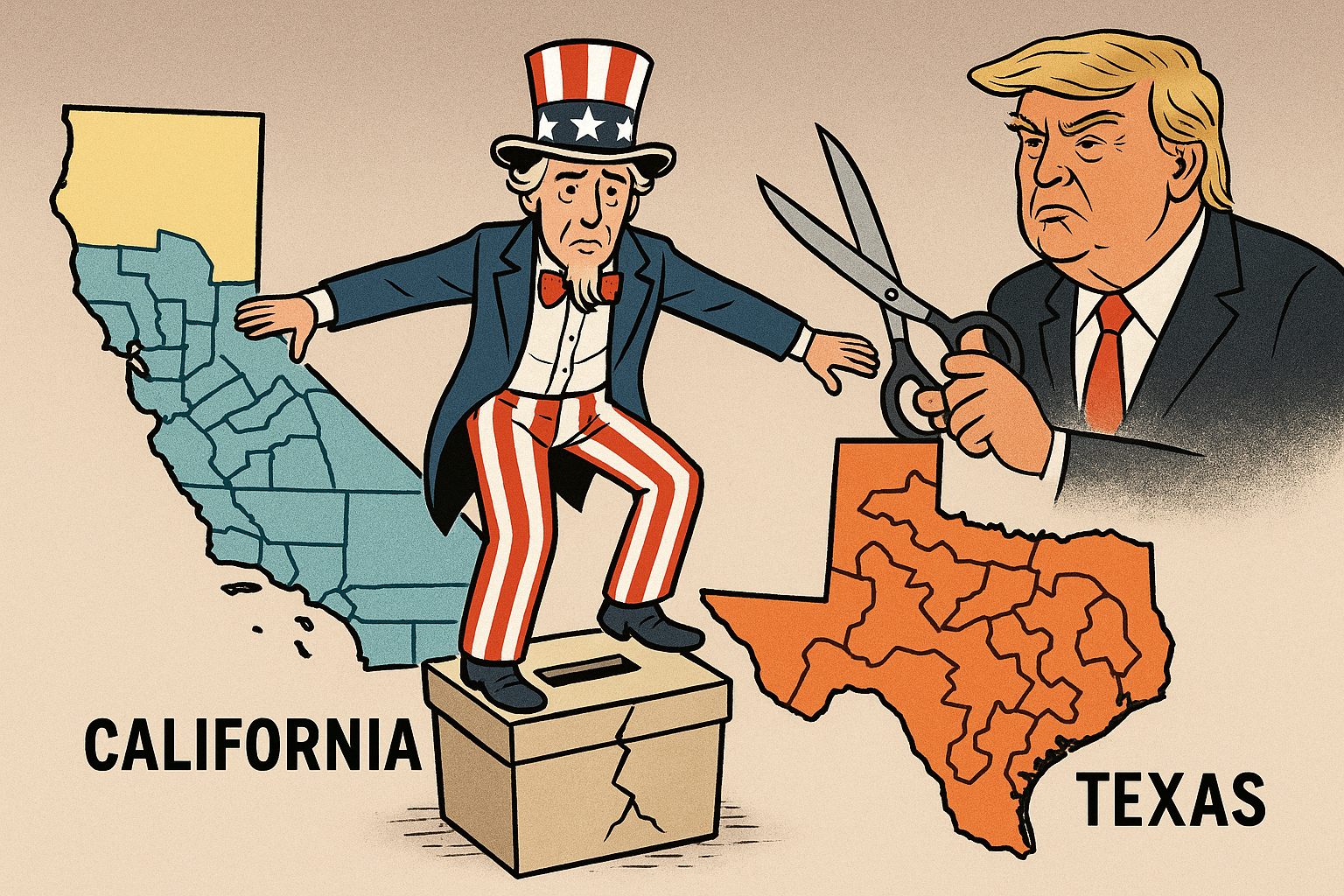Democracy on the Line: Gerrymandering, Trump, and the Fight for Representation
As Donald Trump consolidates control over the Republican Party, our nation's commitment to democratic principles has diminished. This decline is glaringly evident in the way some MAGA supporters attack anyone who dares to label the United States as a "democracy." To them, this term signals a lack of constitutional understanding; "The United States is not a democracy," they will insist, "it is a republic."
This argument is based on their belief that "republic" and "democracy" are mutually exclusive concepts. However, being a republic means that our head of state is not a monarch (No kings!) and political power is derived from the people. The way we express that power is through democratic processes.
Supporters of Trump attempting to diminish the importance of democracy often fail to recognize that democracies can be either "direct" or "representative." If the United States were a direct democracy, every citizen would need to vote on every issue, a logistical impossibility in a nation of over 340 million people. Instead, we elect representatives to decide on our behalf, which remains a core feature of our democratic system.
Throughout American history, the ideal of representation through "one person, one vote" has been an aspirational concept. The Founding Fathers counted slaves as three-fifths of a person for apportionment purposes, and only after a bloody Civil War could black people vote, but only if they were male. For the first 144 years of this country, women and men were not created equal when it came to the ballot box. Additionally, until 1971, Eighteen-year-olds could be drafted but not vote for the politicians who started the wars they were expected to fight.
The structure of the Senate, where each state, regardless of size, has two senators, further challenges the principle of equal representation. For example, the senators from Wyoming represent 587,618 people, while Alex Padilla and Adam Schiff have 39.43 million constituents in California.
The bizarrely shaped district that gave birth to the gerrymander description
Gerrymandering provides another impediment to equal representation at the ballot box. By drawing district boundaries without regard to community cohesion, politicians manipulate districts to favor their own party, often diluting minority voices.
California has been at the forefront of efforts to combat these practices. Led by Governor Arnold Schwarzenegger, the state established an independent redistricting commission, composed of balanced partisan and independent members, to create fairer Congressional districts. These districts are less likely to take on the unusual shapes you would find in a gerrymandered district.
Some Trump supporters claim that California is still heavily gerrymandered based on the proportion of registered Republican voters to the number of House members from the GOP. According to their logic, since there are about half as many Republicans in the state when compared to Democrats, the GOP should control about a third of California's House delegation, or 17 seats. They currently control only nine.
This assertion overlooks the fact that the independent commission's goal is to prevent manipulation, not to guarantee proportionality. Five percent of voters who registered with parties other than the Democrats or Republicans have no voice in Congress. This means their views are not represented, but it does not necessarily indicate gerrymandering.
An attempt to change federal law so that all states would have to use a system of apportionment similar to California’s was filibustered by Republicans in the Senate. This lack of uniformity leaves Californians at a disadvantage, as has been highlighted this year by the unusual mid-cycle redistricting pushed by Republicans in Texas. Not content with a process that already favored their party, Texas has redrawn maps that no longer conform to the Voting Rights Act and purposely dilute the representation of minorities. This will give Trump five additional safe seats for an election and an insurance policy in an off-year election that is traditionally difficult for the party in power.
Governor Newsom Press Office Twitter Feed
California, with its Democratic electorate, is well-positioned to push back against such tactics. This is amplified by the Governor's presidential ambitions and the base's demand that the party’s leaders finally fight back against Trump.
Unfortunately, Newsom and his supporters have once again shown that they will always bring a knife to a gun fight. They will ask the voters to temporarily put aside the independent commission and adopt more partisan maps until the next census, but they will only attempt to equal the efforts in Texas. This leaves no margin against other Red States that have indicated they will also attempt to disenfranchise Democratic voters.
Instead, the California legislature should have claimed as many seats as possible for the Democrats. It may have taken districts that looked more complicated than a salamander, but the goal should have been a delegation that lacked a single supporter of Trump.
Manipulating the electorate in this way goes against everything progressives have fought for in recent history, but the threat of permanently losing all representation cannot be ignored. It is not hyperbolic to call Trump a fascist who would throw away our democracy without hesitation to secure more power. With Republicans controlling the presidency, the House, the Senate, and the Supreme Court, he has been able to kidnap immigrants (and citizens) off the streets and trample their due process rights. He has put the military on the streets of Los Angeles to intimidate people from using their First Amendment right to protest. Taking the high road at this point has the potential to wipe away all freedoms, including any chance of ever achieving equal representation in Congress.
Carl Petersen is a proud father of five adult children, including two daughters on the severe end of the Autism spectrum. A passionate advocate for special education, he ran as a Green Party candidate for the LAUSD School Board. Renowned education advocate Dr. Diane Ravitch has praised him as “a valiant fighter for public schools in Los Angeles.” Recently, Carl relocated to the State of Washington, where he is embracing his role as “Poppy” to two grandsons. You can explore his insights and perspectives through his blogs at www.ChangeTheLAUSD.com.




